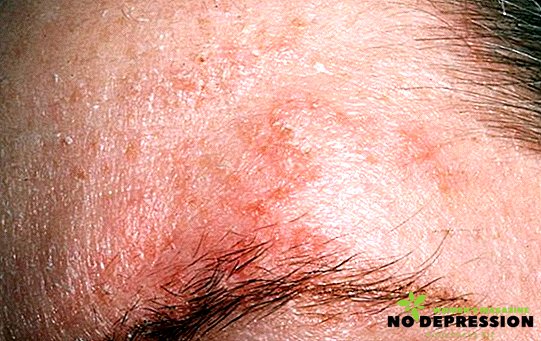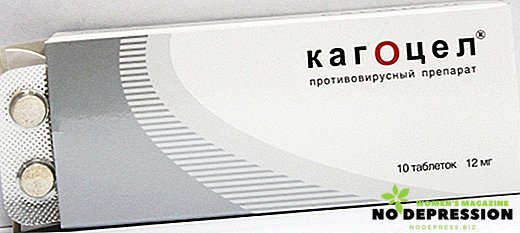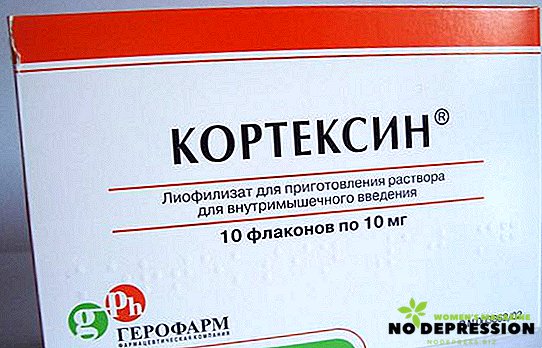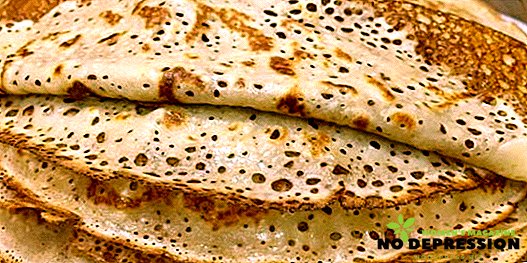Ledum leaves marsh is a plant, which ancient healers knew about the beneficial properties of. Other names of the culture are rosemary forest, fragrant bagan, hemlock and Klopovnik. Its branches and leaves emit a intoxicating odor, therefore the marsh ledum is considered a poisonous plant. However, its correct application helps to cope with various diseases and prevent the development of complications.
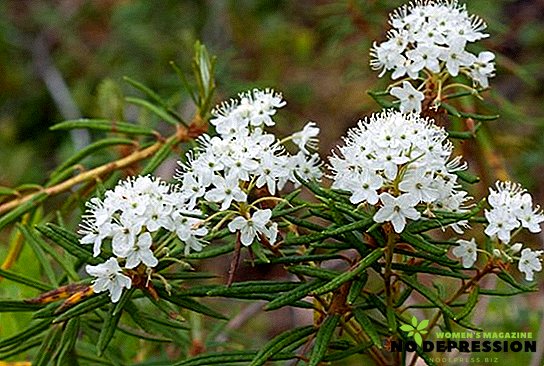
Morphological description
Ledum is a marsh is not such a rare culture, but many residents of the steppe places do not even know what it looks like. Mostly the plant lives in swamps, forests and tundra of Siberia and the Far East.
Ledum is a branched shrub that can reach a height of no more than 1.5 meters. The culture blooms in May-June; flowers of white or pink color are formed on it. They produce a strong enough smell, so a long stay of a person in the thickets of a plant can lead to dizziness and headache. In addition, there may be a condition that resembles a slight intoxication, there are even bouts of vomiting.
Chemical composition
 In addition to the root, every part of the plant contains a large concentration of essential oils, which endow it with a specific odor. Ledum is a source:
In addition to the root, every part of the plant contains a large concentration of essential oils, which endow it with a specific odor. Ledum is a source:
- bioflavonoids;
- glycosides;
- tannins;
- coumarins.
Among the essential substances can be distinguished gladol, palustrol, tsimol and others. Of these, glacier is considered the most dangerous for humans, as it can lead to undesirable consequences for the body.
In a small concentration in the plant there are many minerals, vitamins, useful enzymes and organic acids. It is important to remember that the younger the culture, the greater the volume of valuable components it contains.
Scientific research of the wild rosemary
The earliest references to culture date back to the 12th century and were made in Danish provinces. In Europe, such a plant was introduced into medical practice by Swedish doctors, and in folk therapy, culture has been used since the 16th century.
Studies have shown that the use of wild marsh tea for a long time does not cause the effect of addiction. It is for this reason that drugs based on it are allowed to be used for several years, for example, with maintenance treatment of pulmonary tuberculosis, asthma and other diseases that are accompanied by cough.
Under the guidance of Professor Berezovsky, P.P., a wild rosemary research was performed at the Siberian Medical University and its pharmacological efficacy was revealed. In addition, the value of the plant was confirmed as a biologically active component of many drugs.
In 2004, work was conducted at the Tomsk Medical University to study the antioxidant properties of the extract of wild rosemary tea, made from its shoots. It was found that the culture can be used for the prevention of oxidative processes in the body, which are accompanied by the destruction of cellular structures.
Collection and harvesting plants

Lushum marsh begins to bloom in early May, emitting a powerful heady smell. Abundant flowering is a sign that you can begin to harvest vegetable raw materials. It is permitted to engage in harvesting even after full ripening of its fruits.
Usually, young shoots are used for drying together with leaves and flowers. Before drying, they should be laid out under a canopy on paper or bundled in small bundles and suspended. In that case, if the harvesting of the plant is carried out in an artificial dryer, then the temperature should not exceed 40 degrees. Dried vegetable raw materials produce a resinous odor that can cause headaches or fainting.
At the end of the drying, the shoots are put in paper bags and stored in a separate place, preventing contact with other herbs. Be sure to follow the rules of storage and the specified dosage, since the culture is considered toxic.
Useful properties and indications
Ledum leaves has an anti-inflammatory effect on the body, that is, reduces vascular permeability, suppresses the inflammatory process and relieves tissue swelling. Treatment with a plant allows you to achieve a positive effect on cystitis, colitis and pneumonia. Water extracts from the plant are considered an effective external agent in the treatment of hematomas, acne, insect bites and bruises.
 In addition, the ledum marsh has:
In addition, the ledum marsh has:
- expectorant;
- vasodilator;
- antimicrobial;
- antioxidant;
- analgesic effect.
In the old days, the plant was used to get rid of unwanted pregnancy. Today, scientists have confirmed that wild rosemary increases the tone of the uterus, therefore, has a pronounced abortive effect.
Plant based preparations are recommended for use in the following pathologies:
- hypertension;
- cystitis;
- bronchitis;
- pneumonia;
- whooping cough;
- diarrhea;
- gastritis;
- rheumatism;
- diathesis;
- eczema.
For the treatment of pathologies, it is recommended to prepare alcohol rubbing, decoctions, tinctures and ointments with the addition of wild marsh tea.
Pharmaceutical preparations with wild rosemary
The following drugs can be purchased at the pharmacy chain:
- Ledin. The main active ingredient is the extract of sesquiterpene alcohol and the essential oil of wild rosemary. The drug is produced in the form of tablets, which are indicated for dry cough and pathologies of the bronchopulmonary system.
- Ointment Ledum-GF. The tool is prepared on the basis of wild rosemary and applied topically to eliminate pain in the joints. In addition, the ointment helps to cope with swelling of the skin and itching after insect bites.
- Fitopril The drug has a complex composition and is used to prevent pathologies of the heart and vascular system.
Ledum oil is considered a powerful drug, which is used as an external agent in the treatment of rheumatism, muscle pain and joint pathologies.
Home Cooking Recipes

Folk medicine recommends cooking decoctions, tinctures, teas and ointments from wild rosemary.
Tea
Tea from wild rosemary is recommended to drink with aching joints, rheumatism and cold, which is accompanied by a strong, painful cough. To make tea, you need a tablespoon of plant shoots to brew with a liter of boiling water and leave for at least 30 minutes. This tea is best to drink 100 ml several times during the day.
Ointment
Plant based ointment is considered to be effective in treating various skin pathologies. To make it, you should mix 3 parts of vaseline or grease with 1 part of wild rosemary flowers. Soak the mixture in a water bath or in the oven for 12 hours. Prepared ointment to use within a week.
Decoction

Broth of wild rosemary is indicated for the treatment of tuberculosis, bronchitis, cough, cold and inflammatory processes in the intestine. To prepare it you need:
- a teaspoon of vegetable raw materials pour 200 ml of water;
- Boil the mixture for no more than 1 minute, then leave it under the lid for half an hour;
- Filter the broth and take 10 ml several times a day after meals.
In the treatment of pathologies of the skin, it is necessary to evaporate half the broth and pour warm vegetable oil into it in a 1: 1 ratio. This means to treat the affected skin.
Alcohol tincture of wild rosemary
Alcohol tincture is mainly used externally for rubbing or compresses for pain in the joints. When taking tincture inside it should be remembered that it is dosed only in drops. For the preparation of the medicinal mixture, it is necessary to combine 5 parts of alcohol and 1 part of wild marsh tea. The resulting mass is placed in a dark place and keep for a day. It is recommended to take alcohol tincture 60-70 ml several times a day immediately after meals.
How wild rosemary helps to quit smoking
Ledumberry is a plant that helps naturally stop smoking. It allows you to achieve an expectorant, anti-inflammatory, bactericidal and wound-healing effect, so it is often used to clean the respiratory tract.
 If you wish to quit smoking, it is recommended to cook broth of wild rosemary in combination with hunter. For this you need:
If you wish to quit smoking, it is recommended to cook broth of wild rosemary in combination with hunter. For this you need:
- Mix in equal proportions of wild rosemary and St. John's wort grass and 2 tablespoons of this vegetable mixture pour 400 ml of water;
- To put the formed mix on slow fire and to torment no more than 20 minutes;
- Remove pot from heat and leave to infuse for 3 hours without opening the lid.
- Drink a means before eating 1 3 cup several times a day.
To prepare the plant, if you wish to quit smoking, you need to pour 2 teaspoons of the vegetable mixture with 2 cups of water. The resulting mass is infused for at least 8 hours in a sealed container, then filtered. Before taking 50 ml of infusion dilute half with hot water and use as tea. With a great experience of a smoker, in order to avoid an overdose, it is recommended to simply rinse your mouth with infusion.
Contraindications and precautions
Improper use of wild marsh wild rosemary can cause harm to the body and cause adverse reactions. There are some contraindications to the treatment of such a plant:
- age up to 14 years;
- the period of pregnancy and lactation;
- pathology of the kidneys, liver and pancreas.
- diseases of the gastrointestinal tract in the acute stage;
- hypersensitivity to the constituent components of the plant.
Excess of these dosages may be accompanied by the appearance of such unpleasant symptoms as dizziness, headaches, increased arousal and irritability. In addition, the patient may decrease blood pressure, develop tachycardia, respiratory paralysis and syncope.



